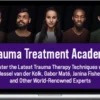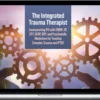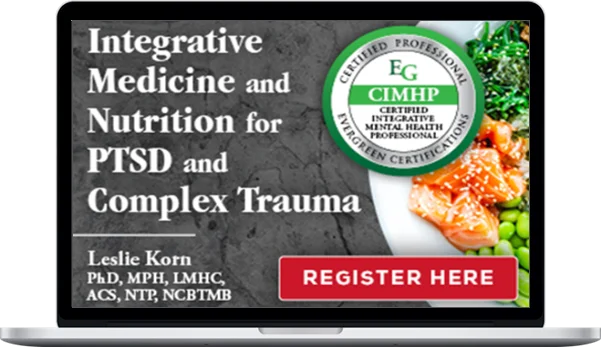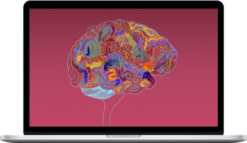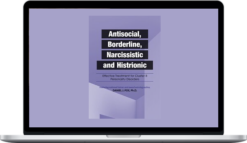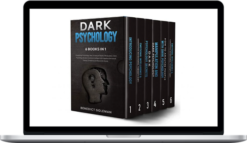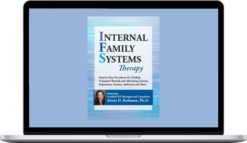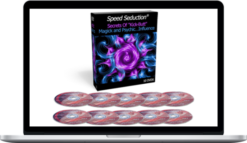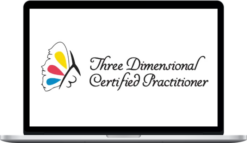Leslie Korn – Integrative Medicine and Nutrition for PTSD and Complex Trauma Course
$49.01 $25.00
Total Sold: 1
»Instant Delivery
Description
Leslie Korn – Integrative Medicine and Nutrition for PTSD and Complex Trauma Course
Trauma is the quintessential mind/body/spirit dis-ease — it’s complicated, challenging, deeply personal and treating it is never “one size fits all.”
Despite the ever-expanding body of research and number of interventions available to help our clients…
It’s just not enough. Especially when our clients are sick and tired of talking about their experiences over and over.
That’s why I’m thrilled to invite you to this online certification course, Integrative Medicine and Nutrition for PTSD and Complex Trauma.
Inside, you’ll learn how to:
- Utilize culinary and herbal medicines to reduce anxiety, depression and pain
- Use nutritional supplements to aid in medication replacement and withdrawal
- Implement body-based strategies for each stage of trauma and for different brain functions
- Create assessments and tests that aid in tailoring interventions for your clients
- Understand the roles of psychedelic medicines and when to suggest them for your clients’ treatment
- And so much more!
I’ll provide you with a step-by-step roadmap for how to treat diverse clients by integrating ancient wisdom with the latest evidence-based methods, all infused with the compassionate clinical art of heart filled care.
Overview of Integrative Medicine and Trauma
Introduction
- Terms of reference
- What disciplines comprise the field
- Thinking integratively as the core feature
- Chronic Illnesses & ACE’s
- Apply a trauma-informed model of self-care, nutritional and integrative approaches
- The principle of substitutions and conscious self-medication
- Integrating IM with other methods
- Polyvagal, IFS, Eye Movement, Post trauma therapy
Ethics & Scope of Practice
- Working independently, group practice, hospital settings
- Legal issues
- Codes of ethics
- Informed consent handouts
- Disclosure documents handouts
- Interpersonal dynamics
- Testing
The Psychology of Trauma
- Acute and chronic PTSD, complex trauma, Dissociative-type, DSM-5®
- Special types of trauma
- Medical, dental, military, white collar (clergy, professionals, gurus)
- Dissociation
- ACES quiz and its relationship to physical health
- Caregiver stressors
- Interpersonal and power dynamics
- Identify the role for IM in attachment and self-regulation in children and adults
Trauma, Biology & the Body
- Energy, fatigue and mitochondria
- Stress response: hypothalamic pituitary adrenal axis
- Dysautonomia (POTS, chronic fatigue, pain, fibromyalgia)
- Chronic illnesses, chronic pelvic pain
- Psychoneuro-immunolgy, autoimmune disorders
- Digestive disorders; gut and dysbiosis
Trauma, Culture & Identity
- Demographics of trauma and ethnicity/identity
- The disease of disguise
- The role of integrative medicine and nutrition in treatment across cultures
- Developing cultural savvy and humility
- Overcoming stigma with integrative medicine and nutrition
- LGBTQ communities
- BIPOC communities
- Disability
- Historical trauma
- Cultural Formulation Interview: DSM-5®
- Video interview with Gary Ferguson: Indigenous traditions for PTSD, cultural and historical trauma
- Assessment and testing of circadian rhythm as it pertains to PTSD
- Somatic Empathy; methods of clinical entrainment in treatment
- The role of pranayama in altering brain hemispheric rhythms
- The brain and heart: heart rate variability and HeartMath technology
- The role of hormones in trauma throughout the life cycle
- Bio individuality and personalized health
- Polyvagal theory, nutrition and integrative methods
- Restoration strategies for digestion from salivation to elimination
- Digestive disorders (GERD, Colitis, NAFLD, Metabolic syndrome, IBS constipation) in complex trauma and PTSD
- Video demonstration of Dr. Korn teaching clients a visceral self-massage to improve digestion
- Conducting an integrative medicine and nutritional assessment for trauma and its sequela
- Review of ethics and scope
- Tests, assessments, and analysis
- Handouts
- Demonstration of the assessment process
- Food mood diary and analysis
- Measures and tests of personalized health
- The role of nutrition in PTSD and complex trauma
- Introducing the food-mood connection to your client
- Age and stage specific food and dietary recommendations
- Techniques of intermittent fasting, ketosis and the brain
- The Brainbow diet: how food colours reflect nutrients
- Fantastic fungi; integrating medicinal mushrooms into the diet
- Developing a stage-based plan congruent for the client and family
- How culture, ethnicity and genomic testing informs optimal nutrition
- Cultural identity as a pathway to nutrition
- Engaging the whole family in culinary recovery
- Designing psycho-culinary group therapies
- Video demonstration of how and why to make fresh juice
- Review of nutrition research: why is it so confusing?
- Matching supplements to intake assessment
- Assessing supplement quality
- Amino acid therapy for depression, anxiety, sleep, pain, cognition
- Neurotransmitters, precursors, and food
- Vitamins, minerals glandulars, fatty acids
- Fat-soluble and water-soluble vitamins
- What supplements to choose first and why
- The science and clinical use of supplements to enhance or replace pharma
- Creating 3-6-9-12 month plan
- Collaborating with nutrition professionals
- List the evidence for types of herbs and preparations for PTSD and its sequelae
- Adaptogens, nervines, anti-inflammatories, antidepressants, tonics
- Enhancing resilience with herbs
- Cannabis: CBD, THC, terpenes; indications, contraindications
- Essential oils: the engagement of the senses for mood and vagal health
- Drug-nutrient-herb interactions: using a database and keeping your client safe
- Video demonstration: making cafe de ramon: a coffee substitute
- Hydrotherapy: the use of hot and cold water for psychoneuroimmune support
- How hot and cold alters mood, pain, headaches
- Medications
- Managing side effects & tapering off medications
- Discontinuation syndrome
- Detoxing from pharmaceutical medication
- Methods for collaborating with prescribers
- Developing a taper team
- Audio Demonstration of a collaborative phone call to the prescriber about client tapering
- Brain hemispheric dominance exercises
- State-based exercise applied to specific symptoms and capacities
- Balance exercises to enhance emotional flexibility
- Yoga as exposure therapy
- PTSD, hyperventilation syndrome, disordered breathing, and anxiety
- Advanced assessment tools
- Rib breathing and advanced techniques
- Breathing and somatic symptoms
- Video demonstration of yoga and exercises for PTSD and complex trauma by Dr. Korn
- Video of exercises for balance and coordination for complex trauma and MTBI
- Video interview with Jill Charney: yoga for developmental trauma, attachment and self-regulation
- Provide a framework for somatic interventions used in treating PTSD and complex trauma
- Bodywork as exposure therapy
- Energy medicine: neurofeedback, cranial electrical stimulation, and photobiomodulation
- Self-massage and pressure point therapies for pain digestion
- Sensory awareness and integration
- Intersection of trauma in highly sensitive individuals and sensory processing in children and adults
- The role of somatics in treatment
- Bidirectional strategies for eye/brain/mind
- Video demonstration of visceral massage and diaphragm release for anxiety and eating disorders
- The clinical application of eco therapies for children and adults
- Nature-based stress-inoculation and resilience strategies
- Developing peripheral vision in nature for autonomic relaxation
- Barometric pressure, migraines and pain
- The science of canine & equine therapies
- The clinical application of touch using animal therapists
- The role of canine therapists working with victims of violence and the justice system
- Human-animal interaction, self-regulation and attachment
- Terms of reference
- Assessment for readiness and referral
- Medical versus traditional: what the client and clinician need to know
- Research on psychedelics
- Anxiety, end-of life, PTSD
- Psychedelics and the Sacred journey
- Psychedelic medicine
- Mushrooms/psilocybin/psilocin
- Peyote (Lophophora williamsii)
- Ayahuasca
- DMT
- MDMA
- LSD
- Ketamine
- Video interview with George Moscona, LPCC: The sacred path of healing with psychedelic medicine
- Transpersonal psychology and thriving
- Cultivating resilience
- Self-care as a path of transformation
- The wounded healer
- The role of stories in reclaiming self as hero
- Rituals for recovery:
- Psychobiology of rituals
- Co-creating individual and group processes
- Special treatment needs when the traumatic etiology derives from spiritual/religious authorities
- Video interview with Candace Hammer Chaney: Integrative medicine at the end-of-life
- Motivation and adherence strategies
- Shared decision making: best practice guidelines
- Identifying the time required for change
- Self-disclosure strategies
- Developing group and telehealth support
- Motivational Interviewing and engagement
- Relapse prevention strategies
- Avoiding pitfalls
- Therapist/clinician as coach and cheerleader
- Creating a treatment plan based on the assessment
- Delivery of treatment plan
- Educating the client
- Return to initial goals
- Language and strategies for introducing these methods to clients, families and colleagues
- Managing skeptics and resistance
- Affordability and access strategies
- Strategies for developing a successful practice
More courses from the same author: Pesi
Delivery Policy
When will I receive my course?
You will receive a link to download your course immediately or within 1 to 21 days. It depends on the product you buy, so please read the short description of the product carefully before making a purchase.
How is my course delivered?
We share courses through Google Drive, so once your order is complete, you'll receive an invitation to view the course in your email.
To avoid any delay in delivery, please provide a Google mail and enter your email address correctly in the Checkout Page.
In case you submit a wrong email address, please contact us to resend the course to the correct email.
How do I check status of my order?
Please log in to HealthcareCourse account then go to Order Page. You will find all your orders includes number, date, status and total price.
If the status is Processing: Your course is being uploaded. Please be patient and wait for us to complete your order. If your order has multiple courses and one of them has not been updated with the download link, the status of the order is also Processing.
If the status is Completed: Your course is ready for immediate download. Click "VIEW" to view details and download the course.
Where can I find my course?
Once your order is complete, a link to download the course will automatically be sent to your email.
You can also get the download link by logging into your HealthcareCourse account then going to Downloads Page.
Related products
Total sold: 8
